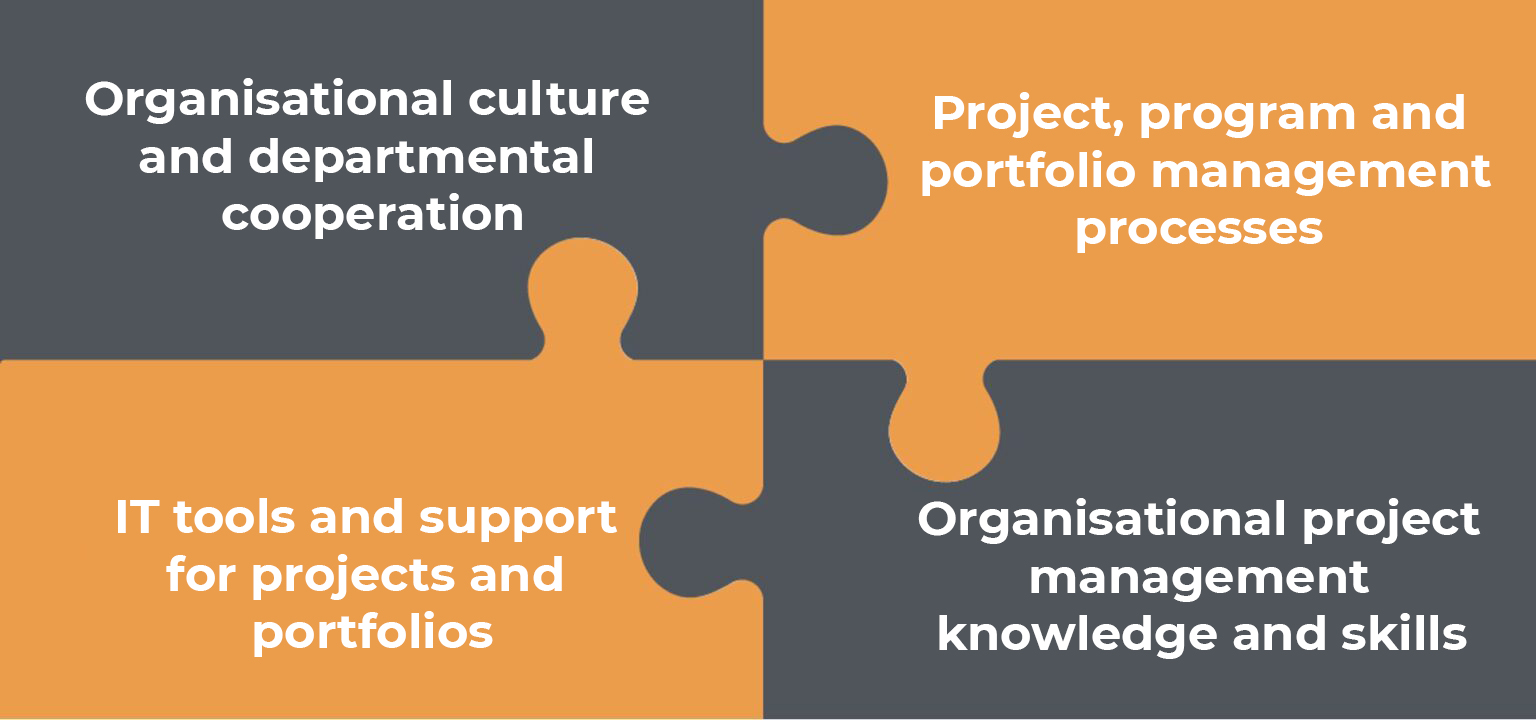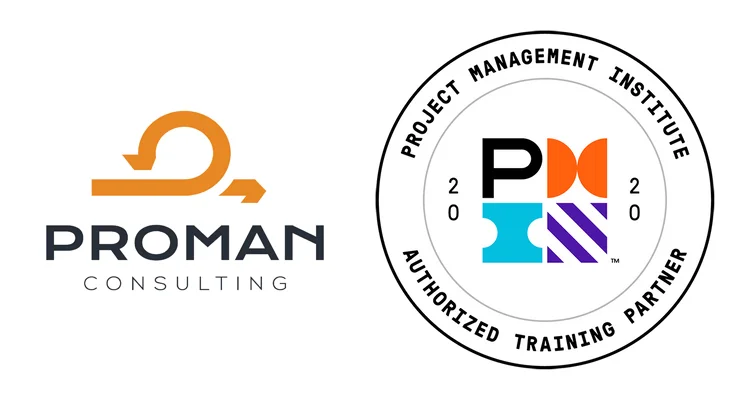Which project management training should I choose?
Project performance worldwide
41% projects fail
Nowadays, there is no organisation that does not have projects of all sizes. International surveys show very different results in terms of their success.
According to the latest international survey by the Project Management Institute (PMI), the world's largest project management organisation, at the end of 2017 on average, 68% of projects reach their target, 58% are completed within budget and 51% are completed on time.
These figures show that there is plenty of room for improvement in project management. What factors can help projects succeed, how can we improve the effectiveness of our projects?
Overview
- Project management success factors
- How can we help?
- What is project management?
- Roots, problems, development opportunities
- Project management trends and trends
- Benefits of project management training
- Contact
- Open and external project management training
- How do I choose a partner for project management training?
Success factors for project management

In our experience, the success of project management can typically be influenced by 4 elements, as follows:
- Project and programme and project portfolio management processes
Unified, transparent processes with clear responsibilities and competences. - Organisational culture and structure
Supportive task culture, good governance, value-based approach. - Project management knowledge and skills
Strong hard and soft skills, project management skills. - IT support
A simple but supportive IT tool that reduces the administrative burden.
How can we help?
Project management, made simple
Our consultants and trainers have led real business projects and portfolios in medium and large multinational companies, so we emphasise theory over practicality, and we don't believe in professionals who haven't seen a real project in the flesh for 10 years.
In all cases, we define specific development goals and the applicability of the tools is experienced by the participants themselves in our programmes, we avoid over-complicated solutions and believe in the power of simplicity.
Projects everywhere
In many cases, it is difficult to define projects precisely. Our approach is to call a project, or at least a project-like task, any task that aims at some kind of a novel product, service or result Creating, has a clear beginning and end, and in the course of implementation typically coordinated work between several actors there is a need for mutual related tasks to implement.
Project management
In our experience, the success of project management can typically be influenced by 4 elements, as follows:
- Project and programme and project portfolio management processes
Unified, transparent processes with clear responsibilities and competences. - Organisational culture and structure
Supportive task culture, good governance, value-based approach. - Project management knowledge and skills
Strong hard and soft skills, project management skills. - IT support
A simple but supportive IT tool that reduces the administrative burden.
How can we help?
So what is project management? The internationally accepted definition is that project management is the application of knowledge, skills, tools and techniques to activities to meet project requirements, although we prefer the simpler phrase 'the science of getting things done'.
Project management is not an explicit science. It's hard to say, but there are no one-size-fits-all solutions to success. This is mainly due to the oft-mentioned human factor, environmental characteristics and cultural elements. So how can such an elusive "science" be mastered and developed?
Why is project management important?
With consciously applied project management, an average of four times more projects can be successful than with ad-hoc solutions. Tailored, appropriately selected and applied approaches and methodologies can serve and support good teams to a great extent.
The root of the problem
In order to make effective improvements, you need to look behind the problem. What is causing the difficulties? This is typically due to a number of causes, but the good news is that with the right tools, all of the above can be improved.
- Ad-hoc organisational processes, methodologies, practices
In case of ad-hoc operation or inappropriate organisational application, a uniform, yet sufficiently flexible project management process design, its implementation, its ongoing operation or even the creation of a project office can be of great help. - Lack of motivation
In the absence of motivation, pre-existing project-based systems of interest, properly structured career paths, sustainable approaches that are not based on short-term "squeezing" of stakeholders can deliver good results. - Target insecurity
In the case of target uncertainty, it is worth examining whether the preparing, formulating and aligning needs with organisational strategy is the right level. A well prepared project idea will save us a lot of headaches later. - Lack of project management experience, knowledge and skills
Last but not least, the in case of lack of project management knowledge and skills, their development recommended. These developments are critical not only for project managers in the traditional sense, but also for the actors involved in the project. In our opinion, such developments should be should always be tailored to the right approach and role, along pre-defined objectives.

Project management trends and trends
The foundations of project management were laid in the early 1900s by Henry Gantt, the creator of the Gantt chart, and it really started to modernise in the 1950s. The ad-hoc project management of the has developed into an independent, learnable profession, which was initially based on a waterfall model and later developed with ever-expanding methodological elements. Today's modern project management distinguishes agile and traditional trends, the latter including waterfall, iterative and incremental approaches.
There is no predefined way for our projects to be successfuland the different nature of projects, project managers will need to have an even wider range of tools, skills and competences. In order for project managers to speak a common language with team members and to understand and know the main processes, some project management training courses can provide them with strong support.

What are the benefits of project management training?
Project management training can provide a range of benefits at team, individual and organisational level. Depending on the project management training you have received, the potential can include, but is not limited to:
- Creating a common language
Creating a common language used by all project participants, and a common understanding of the terms used by all stakeholders. - Knowledge transfer
Sharing experiences and good practices between the trainer and participants. - Skills development
Strengthening skills, mindsets and approaches applicable in specific project situations (e.g. project management, communication, stakeholder engagement). - Clarifying roles, responsibilities
Through outreach programmes, participants can jointly define the framework for future operations, including who is responsible for what in a project and who has what responsibilities and competences during the project life cycle, following international best practices. - Individual development, strengthening career paths
There is a growing demand for good project managers these days. In some cases, progression can be achieved through internationally recognised certificates or further training. - Developing cooperation
Closely linked to the theme of roles and responsibilities, it is critical that project members are able to work together towards common goals. - Practical application
In certain situations, project management training courses can be really effective, where participants can try out specific tools and techniques in simulated situations and projects. This allows them to experience their benefits, limitations and results in practice, with immediate feedback from the expert.

What are the benefits of project management training?
Clients increasingly expect project managers to have internationally recognised qualifications. These qualifications demonstrate that we have the relevant experience, knowledge and tools as project managers.
The market is more valuable certification also available. Existence of project management qualifications strengthens and positions the project leader higher, for organisations, their acquisition can be built into career paths and increase the market value of project managers as well.
We voted for the Project Management Institute (PMI), the world's largest project management organisation, to award project management ratings. As a certified training partner of PMI, we have been awarded the CAPM, PMP, PMI-PBA, PMI-ACP and SAFe we can also prepare our clients for exams without the need for a subcontractor or external expert.
We help you choose
Training category | Beginner (SHU) | Advanced (HA) | Experienced (RI) |
|---|---|---|---|
Traditional project management | |||
Agile journey | |||
Business Analysis |
How do I choose a partner for project management training?
Beyond a certain point, in addition to internal knowledge sharing within the organisation, external, experienced actors may also need to be involved in project management training. This choice is often not easy, as more and more organisations are offering such services. What are the criteria to consider when making this choice?
- Practical experience
The most important thing is that the trainer you choose has practical experience. In our opinion, it is not possible to conduct a credible project management training without the expert having only theoretical knowledge of project management and no personal experience. - Project management qualifications
In the case of exam preparation programmes, it is of paramount importance that the trainer selected has his or her own exam experience and knows what the current trends are in relation to exam questions, as the lack of this can lead to a high degree of uncertainty as to the success of the programme. - Trainer competences
Project management training is rarely lectures. Programmes should also pay particular attention to participant involvement, continuous feedback and experiential learning. The training often requires a worksop management, individual or group coaching toolkit, so it is important that the trainer has the appropriate competences. - Chemistry
We always recommend that participants, or at least the client, meet the trainer in person. It is essential that the trainer and the participants are "on the same wavelength". - Flexibility
During project management training, the focus often changes and practical questions arise, to which the trainer has to react accordingly. It is important that the programme manager does not come with a static, set-in-stone theme, as the aim is always to serve the needs of the participants.




 Designabc
Designabc